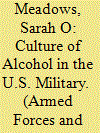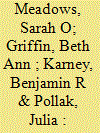| Srl | Item |
| 1 |
ID:
189932


|
|
|
|
|
| Summary/Abstract |
Excessive alcohol use, especially binge and heavy drinking, represents a serious threat to force readiness across the Department of Defense. Though these behaviors are a matter of individual service member choice, they are influenced by perceptions of the culture of alcohol use in the military. This paper uses data from the 2018 Health Related Behaviors Survey of Active Duty service members to explore associations between perceived alcohol culture and excessive alcohol use, any serious drinking consequences, risky driving behaviors, productivity loss due to drinking, absenteeism, and presenteeism. Results from multivariate logistic regression reveal a strong, positive correlation between positive perceptions of drinking culture in the military and all outcomes. Targeting perceptions of the drinking culture is one way the military can reduce excessive and unhealthy use of alcohol and negative sequelae.
|
|
|
|
|
|
|
|
|
|
|
|
|
|
|
|
| 2 |
ID:
146883


|
|
|
|
|
| Summary/Abstract |
Drawing upon data from the Deployment Life Study, this article examines whether female military spouses (SPs) are disadvantaged relative to matched civilian peers in terms of hours worked and earnings, paying particular attention to gaps among the highest educated women. Female SPs do earn less than comparable civilian peers in terms of raw dollars and percentage earnings. Moreover, military wives who are part of the labor force work as many hours as their civilian counterparts, but still earn significantly less for that work. Contrary to predictions, the most educated SPs are not disproportionately affected compared to spouses with less education. These results suggest that SPs at all education levels could benefit from employment assistance; in particular, women already participating in the labor force may benefit from support in finding higher paying jobs.
|
|
|
|
|
|
|
|
|
|
|
|
|
|
|
|